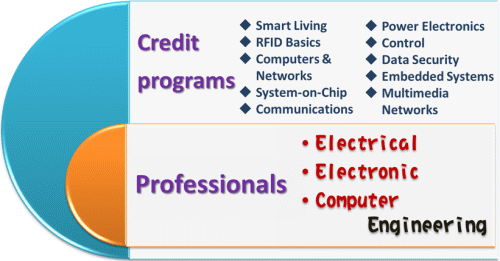Educational Objectives
The College of EECS adheres to the University motto "study diligently, work energetically, devote professionally, and enjoy gregariously", thus drawing up the following educational objectives:
- To train students with the skills of professional knowledge and lifelong learning.
- To nurture students with the capability of field integration and team work.
- To cultivate students with the general capacity of international perspectives and social care.
Teaching Features
While developing the blueprints drawn by the university and college, each department forges ahead and manages pragmatically to increasingly show the characteristics of teaching and research. The Department of Electrical Engineering provides courses in electricity conversion, control engineering and computer engineering. More emphases are laid on the power electronics, motor-driven techniques, computer and control engineering. The Department of Electronic Engineering grabs the essential features of 3C (information, communications and consumer electronics) in the field of electrical and computer engineering. Its development is focused on three areas, namely, computer networks, communications & signal processing, and computer-aided design of integrated circuits. The research priorities of the Institute of Computer Science and Information Engineering follow the main shaft in digital media and Internet communications, which are classified into three major directions including "physical layer", "communication layer" and "application layer". The Bachelor Program for the college of EECS (BP4EECS) focuses on professional education. This program trains students to become outstanding talents with both theoretical and practical competences.
Course Design
In order to reach the goal of "academic internationalization, research excellence, programmatic curricula, teaching diversity", the college of EECS offers students a very flexible course design. In the aspect of teaching, each department makes up course specifications based on the following core capabilities:
- The capability of utilizing mathematical, logical and electrical & computer knowledge and skills.
- The capability of developing and integrating the related field of electrical & computer technology.
- The capability of applying various tools to discover, analyze, and solve problems.
- The capability of communicating, expressing, project managing, collaborating, and teamwork.
- The capability of broadening international perspectives and carrying out lifelong learning.
The course design is primarily program-oriented, blended with the conception of pluralized learning and integral implementation. Through an appropriate course arrangement and a combination of systematic expertise, the college of EECS currently has three types of professionals, including Electrical, Electronic and Computer engineering. Currently, there are in total 10 credit programs, namely "Intelligent Life Techniques and Applications", "Power Electronics", "Communications", "Computers and Networks", "System Chip Design", "Control Engineering", "Information & Communication Security", and "RFID Fundamental Application Technology", "Embedded Systems", and "Multimedia networks". In the future our teaching system will continue to carry forward the advantages of the aforementioned programs, further forming a matrix structure to promote the teaching performance in a more efficient way and cultivate the students with the ability of interdisciplinary integration.

VIP Professional Learning
Another pride of the college in education is the vertically integrated program (VIP), which is focally sponsored by the teaching excellence plan. This program is primarily designed for undergraduate students to undergo a full range of integrated training. Knowledge is no longer taught in fragment. The practical way of doing this aim is through the establishment of research laboratories that make up the bases of learning groups, and then moving toward the construction of educational learning environment in multiple or interdisciplinary areas. Especially this program guides college students to enter the relevant laboratories so that they can learn as beginners, participate in the practical implementation, and validate what were taught in classes. Through the way of vertically mingling with graduates, the undergraduate students have the opportunities of accepting the guidance of the teachers and seniors, strengthening the capacity of analyzing problems, learning how to use knowledge and verbal expression to solve practical difficulties. Eventually, the students will develop specialized skills demanded by specific technologies via a teamwork approach.

